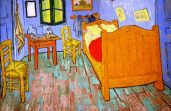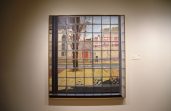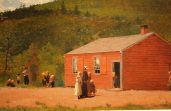July 2007
Identity and Happiness
To understand what propels us forward, we must first examine from where it is we have come
There was an article in Time Magazine describing twenty things you need to do to be happy. Among the list, was Identify with Your Heritage:
Appreciating one’s culture creates and strengthens bonds with others who share that culture and also allows one to identify and appreciate cultural difference. A recent study showed that adolescents of Mexican and Chinese ethnicity maintained feelings of happiness despite daily stress when they had a strong sense of cultural identity. In other research, psychologists found an association between stable cultural identity and overall positive emotion in African American and Native American communities. ¹
It seems reasonable enough. The more comfortable we are with who we are, the happier we will be; but what happens when our identity is hyphenated, like it is for so many Americans? When we are children of immigrants or children of a mixed marriage, an antiquated term, at best? With whom should we identify to find our happiness?
I am an American because I was born in Columbus Ohio, and because I choose to embrace the American spirit. The essence of the American soul is not something from a long forgotten past that lives chiseled in monuments or recorded in books, but rather it is in her people.
As an American woman, I am free to choose my own path without wondering about what the people around me will think. I do not have to worry about social, religious or moral limitations being placed on me by my family or community. I am free to be a feminist and a Republican no matter how much it may enrage my feminist and Republican friends. I get to choose where I want to live and with whom. I can donate my time and money as I see fit, or choose to contribute to no one. I am free to get an education and free to work where ever I like. I can go to the church of my choice, on Sunday morning, or stay in bed and watch the morning news programs. I can also visit historical landmarks and take pride in knowing that the Statue of Liberty, the White House, and the Grand Canyon are all a part of my legacy. I get to celebrate the 4th of July, with German hotdogs and Chinese fireworks, pledge allegiance to the flag – and always, whether I want to or not, shed a small tear or two, as I stand for the playing of the Stars Spangled Banner.
But I am also Cuban. The two identities do not always live harmoniously. To be an American means that we live in the present while remembering the past, but to be Cuban means that we live in the past, while trying to forget the present. I live in a country that is rushing toward the future, but I am nostalgic for a land that seems to exist only in my mind. I am suffocating in a paradox where nothing is as it appears and nothing appears as it is. It is my pleasure to be an American; but it is also my honor to be a Cuban. Being an American is easy; being a Cuban is much more complicated.
I grew up listening to stories about a country that no longer exists. Its borders were not obliterated by a world war, a United Nations resolution, or even an attempt to erase a colonial past with a change of name. It would be good to think that she died of natural causes, but neither earthquake, volcano, nor tidal wave can be blamed for her demise. Instead, she died at the hands of a mad man – assassinated and left to bleed to death like an animal in the streets.
A few years ago, I moved to South Florida looking for a taste of the lost island nation that had never been my home. It did not take me long to realize that she was dead, and that I had not only missed the wake, but the funeral was over as well; and the widows were no longer even wearing black. There are memorials to her everywhere I look. Men, women, and even small children adorn their bodies, homes, and cars with her lone star flag. Her music can be heard in the streets and the smells of her kitchen fill the air, but who she was, is now only a quickly, fading memory. Yet, like so many of the displaced, I am still dreaming in Cuban, though I know that what I see at night, when I close my eyes, is long gone. I am still hoping for a resurrection of epic proportions, but would settle for the death of a tyrant
Like so many other Americans, my arrival in America can be directly traced to a tyrannical despot. In 1952, on her twenty-first birthday, my mother, of English, Scottish, and Irish decent, left her home, in Columbus, Ohio, and moved to Cuba, to be a missionary. After two years, on what was supposed to be her last night on the island, she met my Cuban, evangelist father. They had a twenty-four hour courtship, and the following day she went back to Ohio, to put her affairs in order, and tell her family that she planned to return to Cuba and marry my father. Six months later, they were man and wife, joyfully pastoring a Church in Placetas, Cuba. I think they might have happily lived out their lives, in Cuba, doing work that mattered to them, and raising Cuban children, had it not been for Fidel Castro.
Instead of raising Cuban children, which would have been much easier, my parents were forced to leave Cuba, and my sisters and I were forced to figure out what it meant to be a part of America’s greatest paradox, the hyphenated identity.
On my mother’s side, of the family, I may be the tenth or fifteenth generation of American. Her family has been in America so long that the memory of who first ventured across the Atlantic, looking for religious freedom or economic opportunities has been forgotten; nor do they know who decided to head to the far west, into the Ohio territories where land was cheap and fortunes could be made. They have no ties to an earlier ethnic identity, except of course that they are Protestants, speak English, and are fond of potatoes and cabbage.
While on my father’s side, of the family, I am the first generation of American. My father was the only member of his family that left Cuba. We spoke Spanish in our home, and went to churches where the services were conducted in Spanish. There were more rice and beans served, in our home, than potatoes or pasta. My father played music in Spanish and all of his books were in Spanish. We were expected to discuss politics and religion, and everyone was entitled to voice an opinion, no matter how controversial the topic. We were also expected to dress modestly, conduct ourselves as ladies, and not do anything that would reflect poorly on our family. As illogical as it may seem, I live with a longing for a country that I have never been to. I play the boleros that my father played, recite the poets that he read, and I am overcome with a melancholy that defies understanding. My furniture is covered with doilies, like the furniture in old Cuban photographs; and I set my table with starched, linen napkins and fresh flowers, just like my Cuban grandmother did, in 1952.
I pride myself in both aspects of my identity, but do I find happiness? It feels more like a constant struggle than a joy. Not only do I struggle within myself, trying to find a way to co-exist in two worlds that require a Special Interest section, in order to conduct the most basic of diplomatic functions; but I struggle with those Americans who do not hyphenate their identity, and the Cubans who think I am not Cuban enough.
It is said that happiness, at best, in an elusive goal. Can it really be found by simply flying the flag? I don’t know, but that is all for now.
~ M~
July 2007
Heartfelt Gifts
The greatest gift is a portion of thyself. ~ Ralph Waldo Emerson ~Today, I received one of the loveliest phone calls of my life. My dear friend Charlotte, called to ask me if I thought my niece might be interested in a tea set, which her aunt had given her, fifty years ago. Charlotte, all but brought me to tears. A few days ago, while sitting around home owner’s association pool, I mentioned to Charlotte that we are planning a trip north to visit some family and friends, and to attend a July 7, 2007 wedding, apparently the most popular wedding date in history. One of the stops, on our trip, will be to see my niece, Beth. I told Charlotte, that I was very excited because I was taking Beth what I like to think of as a hostess trousseau. Most of the things have some personal meaning to me – for example candle sticks my aunt gave me, many years ago. I am looking forward to telling Beth about the things which I am giving her, and sharing their personal value.
I told Charlotte, that when my nieces were little, I would invite them to tea parties. The girls would dress up, I would set the table with my finest lines and china, and we would eat scones and cucumber sandwiches. I am certain that Beth will be quite happy to receive a tea set, and I know that both Charlotte and I will enjoy the giving of the tea set. How delightful it is to be part of helping someone start a new chapter in their life. Yet, what I am experiencing with Beth seems quite different from what wedding experiences are becoming.
There was an article, Going to the Chapel and We’re Gonna Return our Pricey Gifts for Cash, on Fox News.com, on June 21, 2007, which excerpts a Dear Abby column. The original inquiry to Dear Abby, dealt with whether or not a couple could get out of going to a wedding, after being told by the bride and groom to be, that they were asking for expensive gifts, in order to be able to return them for cash. Dear Abby replied that as long as the couple sent a note, expressing their regrets, as they had already accepted, it would be acceptable to skip the wedding. The article certainly resonated with one of my pet peeves: When did getting married become about money instead of love?
In looking over the various registries, for the bride and groom to be, I am amazed at the things which people register for, and am left wondering if mine is the only house, in the nation, without a full bar? How much glass wear can any one family need or house? Where in the world will these people be putting the shot glasses, cordial glasses, white wine glasses, and red wine glasses, both with and without stems, the brandy snifters, Champaign flutes, margarita set, martini set, vodka set, high ball glasses, old fashioned glasses, beer glasses, tumblers, juice glasses, and the go old water glasses?
I am not against helping a young couple start their new life. In fact, I remember, several years ago, accompanying a friend, Lia, to Greece, for the baptism of her niece. As we were walking around her childhood neighborhood, Lia explained that for the most part, the houses had started as single floor dwellings; as children married, parents would build second and third stories to accommodate the new families. It was a lovely thought. Each family had its own home, and a wonderful support system, just steps away. She explained that the two sets of parents, worked together to ensure that the new couple had furniture and appliances. Her own Mother, still had the most beautiful, hand made wooden furniture, I have ever seen, a wedding gift of fifty years past. Lia’s uncle had made the furniture, and Lia’s Mother was still using the furniture – she had not returned it for a store credit, or cashed in to pay off a reception she could not afford. It was a gift given in love and cherished for a life time.
In looking over my treasures, which I am taking to Beth, I have wondered if she will think it silly that I am giving her a punch bowl, and I am fully prepared for things not to be to her liking. But, what I have also thought back to, time and again, as I have separated dishes, and gone through linens, is when my own Mother, began to pass out her treasures. She gave me a pink glass bottle from Romania, which came from a woman she met on a bus, and pink glass to match it, that came from Granny Heminger, who of course we were not related to. There was a wine colored vase that had belonged to Sister Reynoso, and a hand painted bowl which my Mother had found at a second hand store, years before . . . gold colored glass creamer and sugar bowl, the carnival glass pieces, the laces doilies she had made for my sisters and me. I treasure those things more than any dish or table cloth which I have purchased at Williams and Sonoma or Crate and Barrel, both fine stores, where I enjoy shopping.
Setting up housekeeping, for the first time, or starting a new family is about the future; it is good to have bright, new beautiful things which reflect who you are; but it is also important to remember from where we have come. My Mother no longer keeps house, but when I walk into my sister’s homes, and see things which were once my Mothers, I am transported back to my own childhood. I remember my Mother serving us on those dishes, or putting flowers in that vase, and I celebrate her life, as well as that of my sisters. Now, as my nieces grow up, and start setting up their own homes, I am looking forward to having tea in her new tea set, which Charlotte’s Aunt brought her from Bermuda, fifty years ago.
But before tea, I still need to buy something off the registry, so that is all for now.
1 http://www.foxnews.com/story/0,2933,285375,00.html










